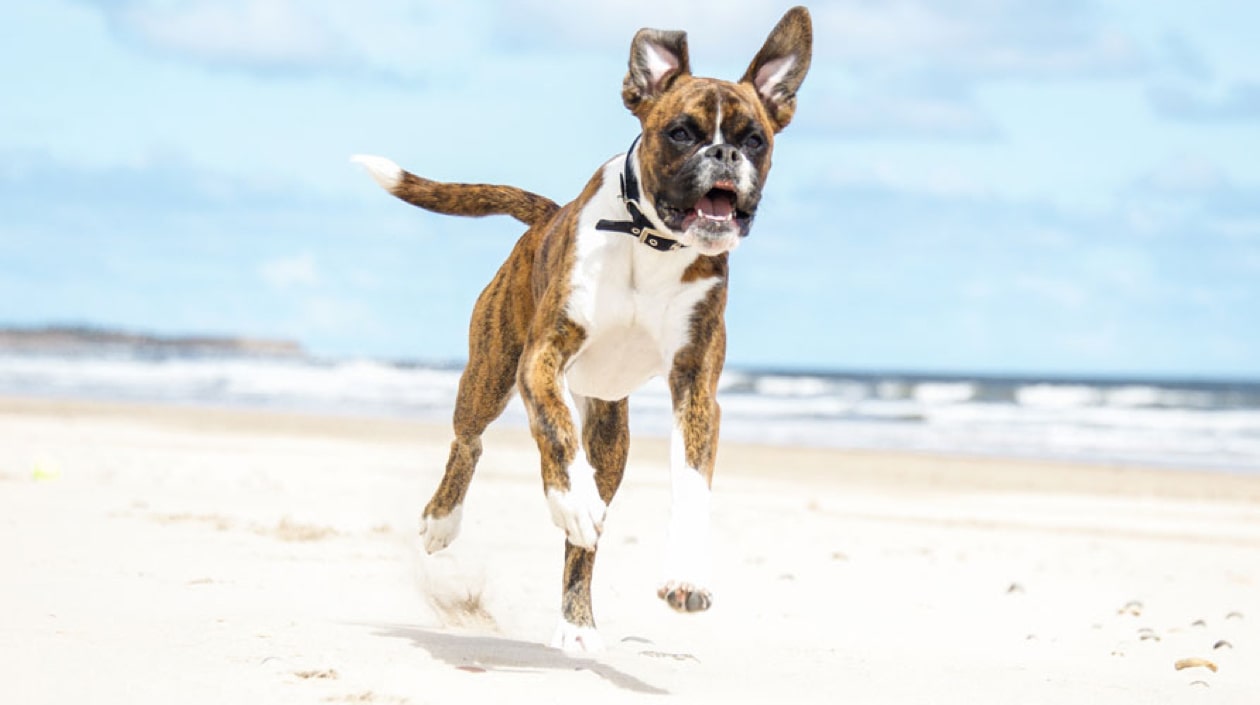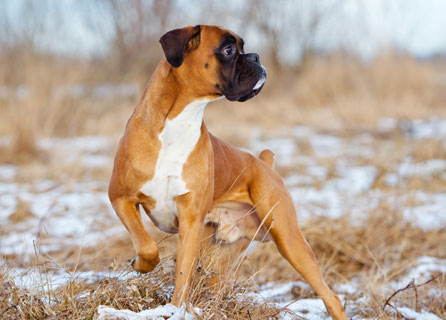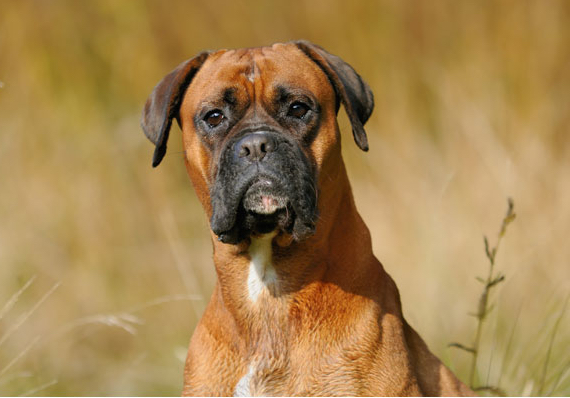
Boxer breed guide
Playful and young at heart, with plenty of get-up-and-go. Boxers are bright and bursting with energy and enthusiasm, making them great companions - if you can keep up with them. Discover this intelligent and alert breed, and get tips on a range of topics from exercise, grooming and behaviour, to what you can do to keep your dog healthy and happy.
Breed information and advice
The Boxer is part of the working dog group and a fiercely loyal friend of the whole family. They should ideally live in a house with a large garden but providing they get regular outdoor exercise they can adapt to smaller spaces. Here's more you should know:
- This breed will love nothing more than showing off for their family.This breed will love nothing more than showing off for their family.
- Thanks to their short, smooth coat they'll only need brushing once a week but they're likely to shed often.Thanks to their short, smooth coat they'll only need brushing once a week but they're likely to shed often.
- On average this dog weighs between 27kg and 32kg, when fully grown.On average this dog weighs between 27kg and 32kg, when fully grown.
- A healthy Boxer will usually live between 10 and 12 years.A healthy Boxer will usually live between 10 and 12 years.
Typical size of a Boxer: Medium: 53cm-63.5cm

Recommended exercise and nutrition
Boxers are one of the most active dog breeds and need more than two hours of exercise every day. Your dog will love to play so make sure you give them enough attention, throwing a stick or a ball when you are outside together. On hot days be careful not to overdo it as a Boxer is unable to deal with heat, due to the shape of their head.
Because the breed is so energetic, you need to ensure your dog gets plenty of high-quality food. The amount you feed them will depend on their age, size and activity levels, and always remember to read the packet.
More than two hours of exercise each day
You and your Boxer should enjoy more than two hours of exercise each day.

Common health problems and illnesses
There’s no reason why your Boxer shouldn’t live a long and happy life. However, being aware of the ailments your dog will be more prone to, along with the associated symptoms, can help you to deal with any health issues that crop up.
This can cause severe breathing problems in some Boxers with shorter faces. The majority of affected dogs can begin to show symptoms between one and three years old, although severely affected dogs may show signs from as young as four months old. Symptoms include noisy breathing and/or snoring. Your dog may show an inability or disinterest in exercise. This is due to them being unable to take insufficient oxygen and therefore it requires more stamina to help them cool down and breathe. Overheating is another symptom where the nasal cavity plays an important role in a dog’s temperature regulation and so dogs with BOAS struggle to maintain the correct body temperature in hot weather.
They may collapse or faint, caused by a lack of oxygen reaching the brain. Sadly, these symptoms are so common that they are often thought of as ‘normal’ for these affected breeds. However, sometimes it is necessary to examine the dog’s throat under anaesthetic as the back of the throat cannot be visualised when conscious.
Aortic stenosis is a type of heart valve disease. The signs of the condition are manifested as a result of the failure to feed the body the right amount of oxygen which is carried by the blood. Common signs include fainting, poor exercise tolerance, poor growth, or lethargy. It’s worth taking your dog for regular visits to the vet, even if they seem very healthy.
If one of your dog’s eyes becomes watery, develops a discharge or seems to be overly sensitive to light, he could have a corneal ulcer. These can develop as a result of a scratch or damage to the eye’s surface, and in most cases can be easily treated by your vet.
Boxer dog allergies usually affect the skin, and the first symptom is severe itching. This can lead to excessive grooming and even hair loss. Other symptoms include ear infections and puffy, irritated eyes. Food allergies can also cause gastrointestinal upset and malnutrition. Weight loss and dehydration are also symptoms of intense allergies. Speak to your vet if you have any concerns.
Ulcerative colitis in dogs affects the large intestines and is often associated with inflammatory bowel disease and irritable bowel disorder. With this condition, there is a malfunction of the immune system in which histiocytes (cells responsible for causing inflammation in the body) penetrate the intestines of your dog. It is mostly treated and managed through strict dietary changes. Speak to your vet if you have any concerns.
Find out about insurance for your Boxer
Learn how pet insurance works and what kind of cover you might need for your dog.
Grooming advice
Keeping your Boxer’s coat glossy and healthy is fairly easy to do and they can go months without the need for a bath. Just make sure to brush and wipe down their coat every week or so, to keep it looking sleek and shiny.
Once a week, you should clean your dog’s ears and brush their teeth. Using an approved ear cleaner will help keep them clear and free of infections, while you can buy a special toothbrush and toothpaste to clean away tartar and eradicate bad breath.
If your Boxer’s nails are clicking on your kitchen floor when they walk, it’s time to clip them. They probably won’t mind you doing this, but as with any grooming routine, it helps if you do this from when they're a puppy so they get used to the sensation. Be careful not to cut their nails too short, or it could cause bleeding.
Fun and interesting facts
- Brandy the Boxer set a Guinness World Record in 2002 with her 43cm long tongue.
- When your dog is excited, they might make a 'woo woo' noise rather than a bark - a special sound only the Boxer makes.
- Your dog will be noticeably sillier than many other dogs in the park, as this breed takes much longer than most to reach maturity.
- This breed was first bred in Germany in the late 19th Century.
Important information
The content on this page aims to offer an informative introduction to pet breeds, but does not constitute expert veterinary advice. If your dog or cat falls ill or has an injury, contact your vet immediately.
All facts and figures were correct at date of publication and were compiled using a range of sources.
Discover more breeds
Browse our other cat and dog guides to learn about some of the UK’s most popular breeds.